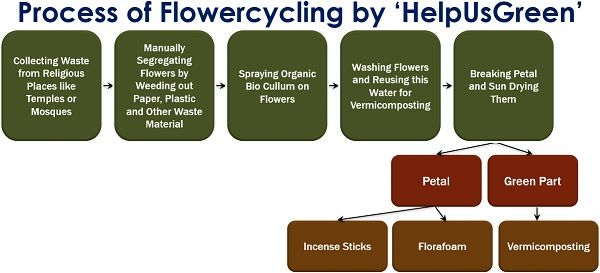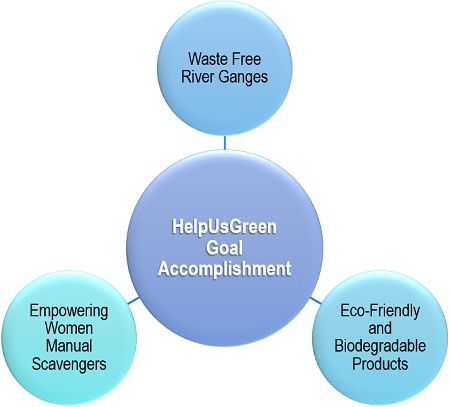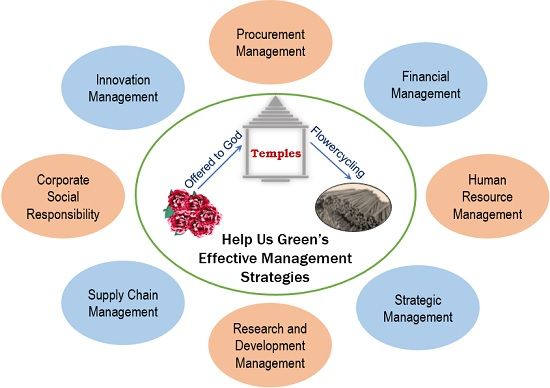Definition: Entrepreneurship is the process of establishing a practically viable business model on the grounds of an innovative concept. It is the emergence of a new era by way of research and development. An entrepreneur is not an ordinary businessman. But, he/she is someone who introduces a new idea, technology or product to the world.
Wantrepreneurs think of evolving as successful entrepreneurs. However, only the ones with a lot of hard work, determination and robust concept, become the achievers.
Content: Case Study on Entrepreneurship
Help Us Green’s Entrepreneurship Model
Today, we have picked up a motivating brand ‘Help Us Green’ to enlighten upon the whole the concept of entrepreneurship.
About the brand
‘Help Us Green’ is an Indian sustainable social enterprise and successful entrepreneurship model. It converts the waste from religious places into incense sticks, florafoam and vermicompost.
The company started in Kanpur by Ankit Agarwal (the brain behind the brand) and Karan Rastogi in the year 2015. The primary investment was just Rs. 72000.
Once when Mr Agarwal took one of his friends from the Czech Republic to visit river Ganges in Kanpur, the latter was startled to find that the river was alarmingly polluted.
He asked Mr Agarwal that if this is a holy river and people are worshipping, bathing and even drinking water out of it; then why is it so dirty?
Mr Agarwal made his friend aware of all the possible reasons for such contamination like disposal of waste from factories, tanneries and sewers. His friend then asked, why don’t you do something about it?
To this Mr Agarwal was astonished and answered that no one can do anything about it. The same moment to their surprise, a temple’s truck dumped a load of offered flowers into the river.
At this point, the idea of doing something out of temple waste to stop river pollution struck Mr Agarwal. He discussed the concept with Karan Rastogi, one of his childhood friends.
After six months of research on temple waste, Mr Agarwal left his job. The investigation showed that the pesticides in these floral waste adversely affects the marine ecosphere.
In the next year, the duo was successfully able to introduce the flowercycled products. The prominent out of these were the incense sticks and cones, which contained no charcoal and were made out of rose petals. Also, the leaves were used to form organic vermicompost.
The idea has been so innovative that even the packaging material used is a biodegradable paper embedded with the holy basil seeds. The thought behind this is people after using the product, instead of throwing away the packet can plant it in their surroundings.
Vision: Ensuring equal opportunities for growth and rights to every human being.
Mission: The principal objective was to preserve the river Ganges. Later on, in the process, new social goal of empowering the vernacular people through employment was added.
Flowercycled Products
The products emerge from recycling the flowers which were offered to God in the temples and mosques. The brand follows an integrated process through which it converts the floral waste into organic items.
The three significant products acquired from flowercycling are incense sticks, vermicompost and florafoam.
The steps involved in the processing of the waste flowers are as follows:

In the above processing following final products are formed:
- Phool – Incense Sticks and Cones: Rose petals processes into incense sticks and cones.
- Florafoams: Marigold and other flower petals are treated to get florafoams. This product is ready to be introduced in the market and is under the process of product licensing at present.
- Mitti – Vermicompost: The stems, leaves and green parts are naturally processed to form organic fertilizers. It is full of minerals, enzymes and nutrients.
In addition to these products, the Help Us Green is also manufacturing the following products:
- Soaps: The brand is also making organic soaps out of these temple flowers.
- Bio Leather: To provide an effective alternative to animal skin leather, the brand is in the process of manufacturing a vegan leather from the floral waste.
Goal Accomplishments
The founders have defined a new height of success by fulfilling their key objectives and the organization’s mission. Following are the three significant achievements of the brand:

Waste Free River Ganges
Floral waste from the surrounding temples and other religious places was a substantial reason for pollution in the river Ganges. Help Us Green initiative reduced this contamination remarkably. The founders have effectively neutralized the effect of eleven tons of pesticides, to date, which was earlier the reason for fish mortality.
Eco-Friendly and Biodegradable Products
The company manufactures many organic products like incense sticks, incense cones, soaps, vermicompost, along with its packaging material. The founders have also developed florafoams which are completely biodegradable.
Empowering Women Manual Scavengers
Their mission or motive was to provide a dignified life to the women by employing them as flowercyclers. Earlier, these women used to work as manual scavengers by ensuring superior facilities and fair wages to them.
Analysis
Entrepreneurship is all about innovation and experimentation. The founders evaluated and framed different aspects of management and suitable principle for their unique business model. While assessing the business model of Help Us Green, we have studied the brand’s entrepreneurial journey into the following management fields:

Corporate Social Responsibility
This entrepreneurial opportunity emerged from the urge of doing something to save the holy river Ganges from flower pollution. The complete organizational activities, vision and mission, aims at environmental protection and human welfare.
Innovation Management
The business idea was all about recycling floral waste into organic products. The thought transformed into a real business model due to its viability. During his Master’s, Mr Agarwal had worked on a classroom project of flower recycling, which later considered as an innovative strategy for product development.
The founders further expertized in organic product development techniques through a specialized course.
Procurement Management
The availing of raw material, which was the sacred flowers in this business was an extremely challenging task. In a country like India, where these offerings are considered auspicious, it was tough to convince the temple authorities for providing the flowers.
They assumed that the founders wouldn’t be able to treat these floral offerings with the same respect. Some even doubted their idea. Also, the municipal authorities restricted them from using this waste.
Finally, the duo was able to find out the other way, i.e., convincing those small temples which are out of the municipal reach.
Financial Management
The initial funds invested in the business was Rs. 72000. Further, both the founders individually invested Rs. 250000 (seed capital acquired from their families).
As the market scaled up, the company required more funds. The company is financially backed up by some big names like Social Alpha – Tata Trusts, Draper Richards Kaplan Foundation, Balmer Lawrie and Co. Ltd. and BIRAC.
Human Resource Management
The founders’ human resource strategy also revolved around a social cause. It was to provide a better life and empowerment to the village women. Many of these women previously worked as manual scavengers and earned meagre wages.
Help Us Green employed these underprivileged women at fair wages. The company also provides them bus facility, insurance and medical benefits, along with a respectful life.
Strategic Management
The brand did not just stop here, but it is rigorously working to attain organizational success and new product development.
Recently, it has created biodegradable foam out of flowers, to deal with the world’s fifth-largest pollutant, i.e., thermocol. It is supposed to be 27% more feasible than thermocol.
Research and Development Management
The whole model pillars on research and study; it is also the world’s first brand which initiated flowercycling technique. The company has a fully dedicated team of professionals who are carrying out research activities for providing eco-friendly solutions to environmental problems.
The team is presently working on making vegan leather out of flowers to save animals and reduce leather tannery pollution.
Supply Chain Management
The brand majorly focused on the developed countries’ market to sell its products in the initial business stage itself. The reason behind this was eco-friendly or organic products’ high demand and acceptability in these countries.
Thus, the brand majorly exports its products, in adherence to all regulatory guidelines through certification from USDA (United States Department of Agriculture), Fairtrade and Ecocert.
To penetrate the domestic market, the company made its products available on e-commerce sites like Amazon, Flipkart, Snapdeal and their website too, i.e., HelpUsGreen.com. Also, it is reaching out buyers through offline mode, by selling products in selective stores of some domestic cities.
Conclusion
Help Us Green is a perfect example of social entrepreneurship. It has been motivating people in and around the country to take a step for bringing the desired change. Also, the founders, Ankit Agarwal and Karan Rastogi have provided a new dimension towards recycling by proving that waste can also generate value.
The company now has a vision of preserving the rivers of the whole country. The USP (Unique Selling Proposition) of the products is its organic and biodegradable properties. At the same time, the brand has a definite competitive advantage for their social cause and flowercycling technology.
However, the significant challenges faced by Help Us Green includes spreading awareness about brand and self-help groups’ management.
Leave a Reply